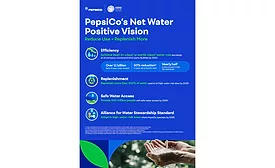Home » Keywords: » water management
Items Tagged with 'water management'
ARTICLES
Company working toward being net water positive by 2030
Read More
PepsiCo Beverages North America, Frito-Lay announce water replenishment projects
Company commits $3.3 million to projects in Winter Haven, Fla., and Galveston Bay
March 14, 2023
Operations Perspective
The conditions and applications impacting utilities in beverage operations
Water remains most important utility for beverage facilities
May 27, 2022
PepsiCo announces ‘Net Water Positive’ commitment
Company pledges to replenish more than 100% of water used in high-risk areas by 2030
August 17, 2021
Nestlé Waters targets positive water impact
Company, partners creating solutions to regenerate local water cycles
June 29, 2021
PepsiCo releases 2020 Green Bond Report
Company has allocated $447M Green Bonds as of Dec. 31, 2019
October 13, 2020
Partnerships key to smart water management
Food, beverage companies, nonprofits collaboratively improve water usage
February 26, 2020
Frigel Eco Dry System debuts cooling systems for plastics industry
Patented cooler saves water usage of 95 percent
November 25, 2019
Green Bond from PepsiCo to fund key sustainability initiatives
Simon Lowden named chief sustainability officer
October 8, 2019
3M HFR Series Cartridge features high-flow capacity for beverage plants
Filters maximize productivity, expand housing compatibility
July 26, 2019
Elevate your expertise in the beverage marketplace with unparalleled insights and connections.
Join thousands of beverage professionals today. Shouldn’t you know what they know?
JOIN NOW!Copyright ©2026. All Rights Reserved BNP Media.
Design, CMS, Hosting & Web Development :: ePublishing









